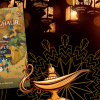Should this lost novel have been found?

Articles on Gabriel Garcia Marquez's last novel to be published by his sons against the author's wishes built up my anticipation and I couldn't wait for April to arrive. Thanks to Bookworm, I got my copy the moment they had it in store and I read it twice. It didn't impress me the first time as it was just a string of chapters describing how a promiscuous woman drove herself into the arms of different men on her annual August 16 visits to a Caribbean island.
When I read Until August the second time, however, I began to appreciate the mastery of language with which Marquez sketched the characters, and painted the picture of an impoverished Caribbean village with "undaunting pigs and naked children". He brought alive the vibrant island nights filled with the sound of boleros and the beat of salsas, and masterfully but mercilessly carved up the heart and soul of the main character, Ana Magdalena Bach, to reveal human vulnerabilities, insecurities, and deepest thoughts in nuanced, wafer-thin layers. Much credit for that also goes to the English translator, Anne McLean, and the editor of the Spanish version, Cristobal Pera.
Although it's a short and easy read, some reading between the lines is required for a deeper understanding of the characters. What stands out is the strong imagery for the setting and the character descriptions. The blue herons, beaches, the lagoon, and "a large black woman snoozing in a beach chair" set a lazy and surreal tone. The heat from the scorching island sun and the sticky humidity in August are palpable and reflect Ana's sweaty and steamy adventures. Her nocturnal trysts and the dance moves are detailed so that the reader can visualise and sense every touch and twirl, down to the stirrings of the soul.
Ana is a complex woman with a pronounced character arc. In the beginning, she is the perfect picture of a 46-year-old, happily married, confident, and beautiful woman who keeps the spark alive in her marriage and can attract men like moths to a flame. She is uncomfortable experimenting and orders the same food each time she visits the island. She prefers shabby hotels over plush ones. Yet, it's intriguing why she's so adventurous with men, and that too only on one night of the year.
Ana's character transition is triggered when she finds a twenty-dollar bill tucked in the pages of a copy of Dracula (Archibald Constable and Company, 1897) on one of her island nights. Egged on by the insult, she is a desperate woman determined to have her way on every night of August 16th. Her escapades ultimately sow the seeds of doubt in her marriage, forcing her to face some hard truths about her husband. Her attempts to cover up her lies create havoc within herself and affect her marriage and relationship with her daughter. By the novel's end, Ana is hitting 50, sad, alone, and stuck in an empty marriage with estranged children.
The short novel offers a vast tapestry and a heaving sea of emotions. Through Ana, we experience her joys and hurt as she plays with her lovers, her discomfort and relief at the confessional visits to her mother's grave, her desperation to catch someone before the night is over, her calm rage when she forces her husband to recount his one-night affair, and her surprise when she finds out somebody else also places gladioli on her mother's grave.
Music forms a robust backbone of Until August, providing the impeccably timed background score with a cadence to match the pace of Ana's story. Even her name is almost the same as Johann Sebastian Bach's second wife, Anna Magdalena, barring one less 'n' in the first name. References to Western classical music, composers, and literary works are made almost on every page. These are not used in vain but shed more light on the characters and context. A thin thread of religious undertone is detected when Ana unknowingly chooses a hotel run by Mormons, doesn't know until later that one of the men she sleeps with is a bishop, and when her daughter, Micaela, joins the Discalced Carmelites.
The vivid descriptions and references to books, music, and dance genres are impressive. Page after page of Ana's indulgence in marital infidelity was, however, a low for me. The ending deserves credit as it was quite dramatic - exactly what is expected from Marquez. Until August is the swan song of his literary career and was written while he suffered from dementia, and it should not be compared to his Nobel prize-winning magnum opus, One Hundred Years of Solitude (Editorial Sudamericana, 1967). Part of me agrees with the author when he instructed that "it must be destroyed" but another part of me feels that it should be read because of the rich imagery and characteristics that evoke the deepest human emotions we are too embarrassed to own.
Zertab Quaderi is an SEO English content writer and social media marketing consultant by day and a reader of fiction and nonfiction books by night. In between, she travels and dabbles in watercolour painting.

 For all latest news, follow The Daily Star's Google News channel.
For all latest news, follow The Daily Star's Google News channel. 









Comments